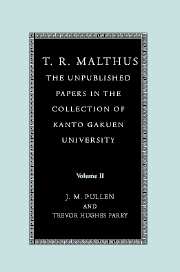Book contents
- Frontmatter
- Contents
- Preface
- Editorial procedures
- List of abbreviations
- Acknowledgements
- 1 Sermons
- 2 Malthus' diary of a tour of the Lake District
- 3 Bullion trade transactions
- 4 An essay on foreign trade
- 5 Essays and notes on Charles I and Mary, Queen of Scots
- 6 Questions and answers on early European history
- 7 Harriet Malthus' diary of a family tour of Scotland in 1826
- 8 Letters to Harriet Malthus from her mother, Catherine Eckersall
- 9 Eight brief miscellaneous items
- Appendix A Additional material not reproduced
- Appendix B Letters to David Ricardo
- Bibliography
- Kanto Gakuen Catalogue
- Index
5 - Essays and notes on Charles I and Mary, Queen of Scots
Published online by Cambridge University Press: 23 December 2009
- Frontmatter
- Contents
- Preface
- Editorial procedures
- List of abbreviations
- Acknowledgements
- 1 Sermons
- 2 Malthus' diary of a tour of the Lake District
- 3 Bullion trade transactions
- 4 An essay on foreign trade
- 5 Essays and notes on Charles I and Mary, Queen of Scots
- 6 Questions and answers on early European history
- 7 Harriet Malthus' diary of a family tour of Scotland in 1826
- 8 Letters to Harriet Malthus from her mother, Catherine Eckersall
- 9 Eight brief miscellaneous items
- Appendix A Additional material not reproduced
- Appendix B Letters to David Ricardo
- Bibliography
- Kanto Gakuen Catalogue
- Index
Summary
INTRODUCTION
These three items are found in different locations amongst the Malthus manuscripts, but are brought together here because of their broadly similar themes. The first is an untitled essay or lecture on Charles I, beginning with the phrase: ‘Charles the first to be considered as more unfortunate than criminal’.
An examination paper entitled ‘Questions in Modern History’ set by Malthus in 1808 for his students at the East India College shows that Malthus lectured on Charles I. The paper (now in the Bodleian Library, Oxford) contains four questions (out of 24) on Charles I. The following question specifically concerns the subject matter of this essay: ‘12. What was the great fault in the character of Charles I, from which his misfortunes seemed chiefly to arise? And what may be considered as the most criminal period of his public conduct?’
However, the rather declamatory style of this essay – ‘How low! How abject did our countrymen bow before the throne of the 8th Henry’ – and its florid language – ‘man blushes not to bend the knee to Despotism’ – suggest that it might have been written, not as a lecture to students, but as a submission in a school or university essay competition. If the thoughts contained in the essay were Malthus' genuine views – and not merely contrived debating points – they provide an interesting insight into his political opinions at the time.
- Type
- Chapter
- Information
- Publisher: Cambridge University PressPrint publication year: 2004



